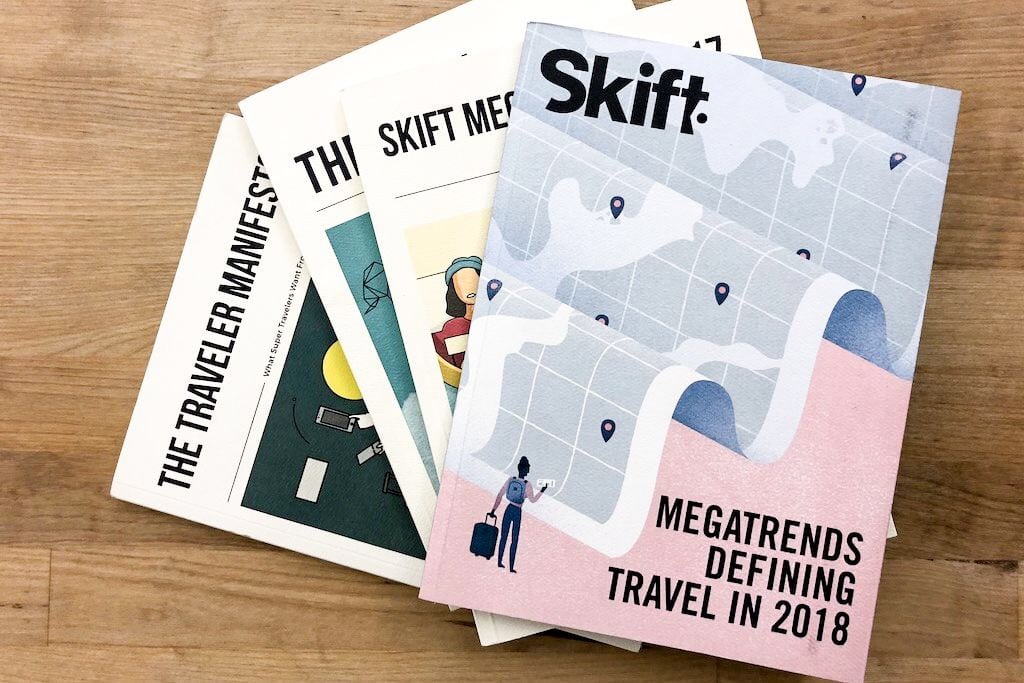Skift Basics: 10 Essential Reads to Understand Global Travel

Skift Take
Skift deciphers and defines the big trends for professionals in the global travel industry. If you're new to it, or considering getting into it, you will be up to speed after reading these. We guarantee it!
If you are new to the travel industry, or new to Skift, here are 10 basic— but deep — reads that will help you get up to speed on the world's largest sector and its place in the world. These are the reads that go way beyond the daily headlines, and connect the dots to look at trendlines in the travel industry over the last few years and how they will be playing out in the years to come.
- Skift Manifesto on the Future of Travel in 2020: This 25-page manifesto released in 2015 brings together a lot of themes we have talked about in the six years of our existence, and some lessons we have learned about the larger changes happening in consumer behavior—especially digital habits—and how they get reflected in travel.
- Skift Magazine: The Versus Issue: The Fault Lines of Disruption in the Global Travel: This magazine issue, launched in the fall of 2015, explores the global fault lines and conflicts that are determining the direction of the travel industry. The opportunities for disruption in the industry lie in understanding and capitalizing on these clashes.
- The Megatrends Defining Travel in 2018: Our 2018 annual megatrends package on the big trends playing out in 2018 and beyond, across all sectors of travel and dining sector. Across new frontiers in technology, brands are focusing on strategic expansion beyond traditional boundaries and innovators are taking new approaches to creating immersive experiences in hospitality in the face of increased digitization, among others.
- The Megatrends Defining Travel in 2017: From overtourism to power-hungry digital platforms to big hospitality and beyond, these were the big trends from our 2017 annual package.
- The Megatrends Defining Travel in 2016: This annual magazine is devoted to our analysis of 15 big trends playing out in the global travel industry, from changing consumer habits, to the big marketing changes happening, to how consumer data are finally being used to understand the traveler, among others.
- The Megatrends Defining Travel in 2015: Our annual megatrends package from 2015, with 14 big trends that cut across all sectors of travel. The Big Three key themes emerging in travel in 2015 were: Mobile. Seamless. Experiential.
- 14 Global Trends That Will Define Travel in 2014: 14 trends from our annual package, that drove the travel industry and consumers that year and beyond. Design, user experience, data, and ease of travel defined travel trends in 2014, and our 14 trends reflected that.
- 13 Global Trends That Will Define Travel in 2013: Skift identified 13 key trends that defined travel in 2013.For the first time since the European Renaissance, the locus of travel is moving eastward, and 2013 continued that inexorable journey.
- The Definitive Oral History of Online Travel: Two decades after the birth of online travel, more than two dozen founders and key players exclusively told Skift how it all happened. This exhaustive history features never-before-published stories from the early days that include a surprising amount of back-room drama, untold tales, victory laps, and tales of what might have been.
- Complete Oral History of Boutique Hotels: Nearly 40 years after the birth of the boutique hotels movement in the U.S., more than two dozen founders and key players exclusively told Skift how it all happened in this 60,000 word deep dive into how it transformed the way we travel.
OTHER RELATED DEEP READS FROM SKIFT:
- Skift Deck: The State of Global Travel 2016: This 137-page Skift deck curates data from every sector of travel and provides a wide sweeping overview of the state of the world’s largest sector and the forces driving it today. This is the State of Travel, from 2016.
- Mapping The Travel Tech Ecosystem: Skift Travel Tech 250: This was our first ever travel industry mapping project, Skift Travel Tech 250, launched in August, 2016. These are the 250 travel tech companies that are shaping the modern day travel experience.
- The Supertraveler Manifesto: The biggest lessons learned from talking to the high maintenance, highly connected travelers, as a mirror to the larger changes happening in consumer behavior — especially digital habits — and how they get reflected and fulfilled in travel.
- How Europe Came Back From the Brink: Despite terror attacks, Brexit-related uncertainty, and nationalist political rhetoric across the continent, Europe saw tourism arrivals soar 8 percent in 2017. How Europe raced back to be a global leader in tourism growth — and what that means to the larger travel industry in the region.
- The Personalization Dilemma In Travel: The magazine examines the dilemma and potential of personalization across all touch points of the travel ecosystem. What does the future of travel tech look like as consumer reluctance to share data grows?
- Iceland and the Trials of 21st Century Tourism: The Skift investigation explores the problems of overtourism, using the explosive growth of tourism in Iceland as a mirror to it. This was the seminal piece that first defined the word overtourism.
Up Next
Hotels
How Data Quality Issues Impact Global Hospitality Operations
There are wide discrepancies in data quality for hotel transactions across global regions, with the largest occurring in Asia-Pacific. Because hotels and agencies need to harness data quality to thrive, they must take a more nuanced regional approach to monitoring potential issues.
Sponsored Tourism
Religious Tourism: The Indian Travel Industry’s Next Big Bet
The money from the pockets of Indian devotees is overflowing from the donation boxes in temples and spilling onto the travel industry. Hotels, airlines, and travel agencies are all placing their faith in the business of religion.
Startups
6 Travel Startups Raise $168 Million Over 2 Weeks: Funding Roundup
The deals are small because the tech is still young, but there’s clearly interest in where it’s headed.
Short-Term Rentals
Vrbo Needles Airbnb in New Campaign: We're 'Hotter' and 'Cooler'
Vrbo, the underdog in the competition, is getting scrappy with its marketing tactics.
Tourism
U.S. National Parks Had a Record Year. But There’s ‘No Public Announcement’ and Staffing Shortages
A record-setting year for U.S. parks may have been something to celebrate in the past, but with staffing shortages and other issues on the horizon, it's unclear whether parks will be able to cope going forward.





